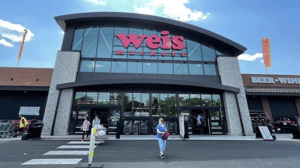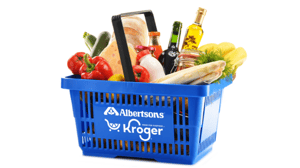AMERICAN-STYLE STORE TO OPEN
VLADIVOSTOK, Russia -- Giant, the first of a projected 25 American-style supermarkets in Russia, is to open here next month as part of an American-Russian joint venture. The store, part of Giant Food Systems, will combine an entire food distribution system under one roof, including retailing, wholesaling, processing and packaging.The first Giant unit, located in an outlying area in this port city
January 16, 1995
ELLIOT ZWIEBACH
VLADIVOSTOK, Russia -- Giant, the first of a projected 25 American-style supermarkets in Russia, is to open here next month as part of an American-Russian joint venture. The store, part of Giant Food Systems, will combine an entire food distribution system under one roof, including retailing, wholesaling, processing and packaging.
The first Giant unit, located in an outlying area in this port city 5,000 miles east of Moscow, will be 100,000 square feet, with
35,000 square feet of selling space and 65,000 square feet of backroom space. It is scheduled to have a soft opening in February and a grand opening in March. A second Giant, totaling 60,000 square feet, is set to open in a densely populated urban area of Nakhodka, another port city, 100 miles east of here, next summer. Each store is projected to encompass a trade area of up to 25 miles, serving more than 150,000 retail customers weekly and another 500,000 weekly through wholesale and cash-and-carry sales to smaller retailers and institutional users. Annual sales are expected to be $15 million to $30 million. It's hoped the joint venture will open three more stores in the next two years and 15 more within five years. Giant Food Systems is the brainchild of Bruce W. Krysiak and his father, F. Bruce Krysiak. The younger Krysiak is a former executive with Southland Corp., Dallas, and A.J. Bayless Markets, Phoenix. His father is former executive of Arden Mayfair, Los Angeles; Loblaw Cos., Toronto, and National Tea, St. Louis. They are currently president and chairman, respectively, of TPC Foods, Columbus, Ohio, a company formed to participate in the joint venture. The venture's Russian partners are Dalryba, a 60,000-member fishing organization based here, and KRPS, a wholesale operation that feeds the families of the massive fishing fleet. According to the younger Krysiak, the Giant stores are being designed to avoid the barriers to efficient food distribution that exist in Russia. "Giant stores will feature a one-step distribution system that bridges the gap from producer to consumer by combining retailing, wholesaling, processing and packaging under one roof," he explained. "Russia has adequate resources to produce much of its own food supply but totally lacks an adequate food distribution channel to deliver these supplies to the population in a consistent and inexpensive manner. "Giant is designed to be a vertically integrated food distribution network that controls or coordinates the flow of food and consumer goods from the point of production to the retail store," he said. "We begin by providing support to local farm cooperatives and food producers to help them generate higher yields of quality products. We then build large Giant food complexes, which organize and concentrate the demand of millions of Russian consumers into efficient points of delivery," said the younger Krysiak. What he hopes Giant will accomplish, he said, is a demonstration to the world, and the Russians themselves, that "once an efficient point of delivery has been created, food producers in Russia, and throughout the world, will increase their investment and production capability, increasing the availability of low-cost, high-quality food products." The Giant store here will feature approximately 2,500 stock-keeping units, including 1,000 to 1,300 American-made products, with the balance from Russia, China and Korea, the elder Krysiak told SN. It will feature grocery, produce, meat and seafood, nonfood, a service bakery and a fast-food section, plus a bulk food area offering rice, sugar and flour. Meat processing and packaging of bulk items, along with wholesale and cash-and-carry sales, will be conducted in the store's large backroom. The store, which will be larger than any other supermarket in Russia, was designed by Arnie Theis, a Columbus, Ohio-based architect who has designed supermarkets all over the United States. Running the Giant stores in Russia will be Richard Schindler, former president of Gristedes, New York, and before that vice president of marketing for Loblaw and National Tea, the two chains where the elder Krysiak was once an executive.
Schindler had been living in semiretirement in Florida when he was tapped by his former boss to take over the Giant operation. He has since relocated to Vladivostok. "Dick Schindler was just the right guy," the elder Krysiak said. "He has decades of food experience, and he's an operator who doesn't mess around. In that tough Russian business environment, we needed someone who could stand up to the Russians and make the tough decisions."
David Poritzky, a recent Cornell University graduate who speaks Russian, will work with Schindler. In addition, said the elder Krysiak, two or three more retailers with U.S. experience will be added before the first store opens. The Giant operation will feature a comprehensive merchandise control and management computer system designed by a Texas company for overseeing inventory, the front end, procurement, scheduling and financial reporting. The elder Krysiak declined to name the company.
The same company also created a selection and training program to instill Western-style management into more than 300 Russian store employees and identified and purchased special processing equipment that wasn't available in Russia. "While the Americans must teach the Russians the management techniques that have been proven more efficient by the past 70 years of free market experience, the Russians must teach the Americans the local conditions," the younger Krysiak explained. "Together, they must integrate the free market management styles with the Russian culture." To stock the store initially, the elder Krysiak assembled a network of U.S. food producers, wholesalers and retailers to supply Giant with millions of dollars in U.S. food products. That function has since been taken over by American Russian Investors, a Denver-based company that was organized as the exclusive purchasing agent of U.S. goods for Giant. According to the elder Krysiak, ARI works with each supplier in the initial stages of product ordering to determine key product items and promotional materials and programs. An automatic ordering system is then set up that links the supplier to Russia "while utilizing the convenience and technology of conducting business in the United States. "We are arranging with U.S. suppliers to distribute through the Giant system to keep the shelves full -- and we're always looking for more suppliers," he said. In forming the joint venture, the partners agreed to each provide at least 50% of the funding, with the Americans also providing food industry expertise, technology, equipment and American-style management. The Krysiaks have contributed more than $6 million in equipment and expertise to the joint venture, the elder Krysiak said, while the Russians have donated slightly more than that. Early in 1993 the U.S. Agency for International Development, through the Citizens Network for Foreign Affairs, matched the Krysiaks' donation with a $6 million grant to Giant to fund programs designed to increase local farm production in Russia. That farm-support program is being directed by Jarlath Hume, TPC's vice president of government affairs. Beyond improving agricultural production, the Giant Food System hopes to improve dairy processing and meat production as well as upgrade methods for importing food. "None of us believes Giant will be successful if we just ship in food from the United States," Hume said. "We need to bring in food to complement the local production and then, over the long term, we have to help local producers increase their output in terms of quality and amount."
About the Author
You May Also Like






